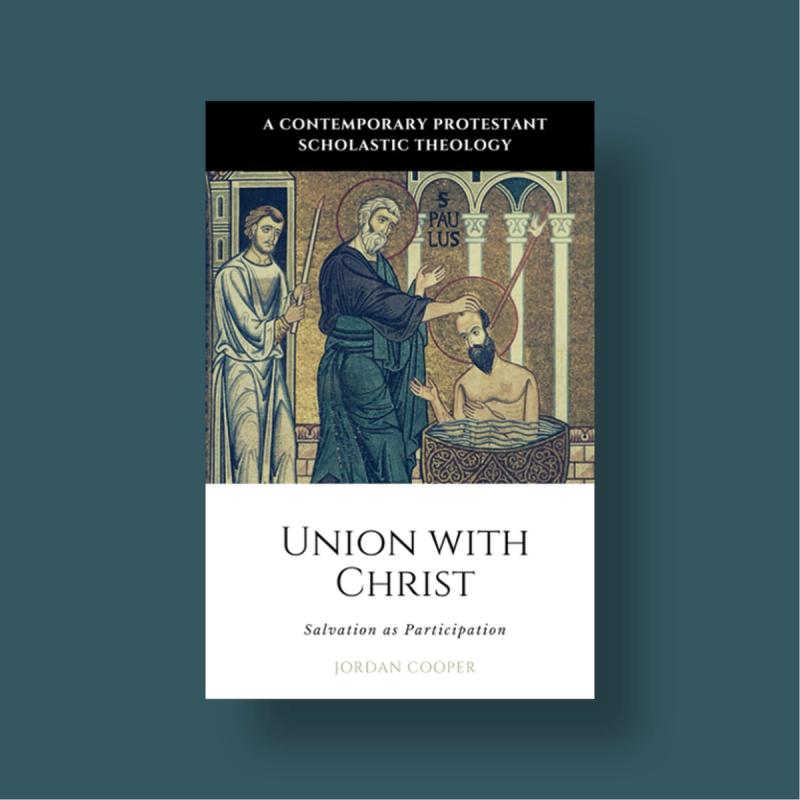***
Just and Sinner Publications | 2021 | 241 pages (paperback) | $24.00
With his Union with Christ, Jordan Cooper adds a second publication to his “Contemporary Protestant Scholastic Theology” series. This publication is projected to be volume six in the overall series, by which Cooper is attempting to rejuvenate seventeenth-century Lutheran Scholasticism, a high point of Lutheran orthodoxy and piety as he sees it. But more broadly, Cooper argues for Classical Protestantism: its use of traditional philosophical categories, its thoroughgoing metaphysical realism, its catholicity, and its practice. Here one finds similarities to other Protestant ressourcement (“return to the sources”) efforts in recent years, say, in Michael Allen and Scott Swain’s Reformed Catholicity or in the renewed interest in Mercersburg Theology.
This Classical Protestant ethos permeates Cooper’s volume on union with Christ. Cooper upholds forensic justification and imputed righteousness, while arguing that “Christ’s union with humanity is not only that of federal headship…but an ontological reality which impacts all of humanity” (90). Though focusing primarily on the Lutheran tradition of which he is a part, Cooper interacts with key Reformed perspectives and some Catholic and Orthodox theologians, noting areas of alignment and departure on issues related to union with Christ.
The book begins with a literature review, most pointedly dealing with developments in Lutheran scholarship connected to union with Christ. Significant attention is given to Tuomo Mannermaa and the Finnish school, which in Cooper’s view “revitalized an essential theme in Christian theology which has been unfortunately neglected by many in the contemporary church.” Yet Cooper also notes how “Mannermaa’s view results in a conflation of justification and union with Christ, which are certainly related concepts, but distinct” (47).
He then provides a philosophical review of sorts, arguing that “the loss of a robust concept of union with Christ is largely due to shifts in philosophy” (90). After a discussion of the perennial question of realism and nominalism (90–98), Cooper falls decidedly on the realist side of this debate, arguing that:
Christ is not simply linguistically related to other people, nor is his connection with other persons merely conceptual. It is an objective, universal, and ontological connection. It is historically with the loss of realism that the incarnation is no longer a central saving event for Protestant thought. (97)
For Cooper, while aspects of relational or linguistic ontology can provide insights regarding the nature of God’s performative word that does what it says, and the nature of man as an “I-in-relation,” he finds such views incomplete.
Cooper then unpacks three aspects of union with Christ that he finds in Lutheran orthodoxy: the objective union, formal union, and mystical union—all of which bump up against a variety of ongoing contentious issues.
He maintains that the redemptive-historical reality of the incarnation creates an objective union between Christ and humanity. For the objective union of Christ with humanity to be applied personally, “one must first be united to Christ in faith,” which Cooper identifies as the formal union of faith (223). This necessitates his engagement with a variety of sources on the relationship between union, faith, and justification, another area hotly debated. Cooper argues that:
Justification does not occur initially to the individual with faith; instead, the verdict of justification was placed upon Jesus at his resurrection. It is through faith that one is formally united to him, and thus to justification, resulting in objective justification being subjectively appropriated by the believer. (165–66)
Third, Cooper contends for a mystical union, as he explains: “Through faith, the believer is justified and also participates in the divine nature” such that “this union is real, spiritual, and mystical.” He then enters fraught territory, incorporating language usually used in trinitarian discourse:
It involves an interpenetration of essences through a perichoretic relationship between the triune God and the human subject . . . wherein there is no conflation of natures with one another, though the divine nature restores and renovates the human person. (217)
For anyone looking to dig deeper into union with Christ, Cooper’s book deserves consideration as part of that investigation as he makes a case that “the forensic nature of justification as well as the participatory reality of union with Christ . . . is most consistent with Scripture” (222). Cooper’s style is eminently readable and not overly polemical—a true gift indeed. He comfortably moves from philosophy to theology, from Reformed to Lutheran sources, from Eastern to Western Christendom. In Union with Christ, readers from a variety of denominations will find much that is thought-provoking and devotional.
Cooper’s synthesis of the extra nos reality of forensic justification with the intra nos reality of the unio mystica is encapsulated in his evaluation of the Finnish school:
[The] problem in the Finnish proposal on union is in its identification between Luther’s idea of justification and that of union with Christ. . . . Such a conflation of these two soteric realities is not necessary, for when the great exchange is properly understood, the forensic nature of justification as explained by the Formula of Concord and a real-ontic union with Christ are both confessed. This unified soteric approach brings together the centrality of forensic justification with Mannermaa’s emphasis on an intimate and mystical union between the believer and Christ, which results in ontological transformation. (143)
Such talk of “ontological transformation” might make descendants of the Reformation nervous, but Cooper’s case for this being part of the historic church’s heritage merits further thought. Such a position also offers a rich sacramental element to life that is missing in much of modern Protestantism.
One of the challenges in a book such as this is the attempt to straddle the academic-popular line. Periodically, further argumentation using additional key primary and secondary sources would have been helpful; too much is assumed at points. For instance, when Cooper uses perichoresis to describe the relationship between the Trinity and human nature, he drops a bombshell but leaves much to sort out. Similarly, some consequential arguments seem to hinge on a few quotes from one author. For example, is Gregory of Nazianzus’s statement that the “unassumed is the unhealed” as clear as Cooper suggests regarding Christ and a fallen nature? And then, using T. F. Torrance as a main source to validate the non-assumptus will give some readers pause.
These quibbles aside, the great mystery of the incarnation and of our union with Christ in his life, death, and resurrection will give energy and sustenance to the Christian life until its final fulfillment in the eschaton. This is not something just in our heads or in our hearts. It is real—objectively in the historic Christ-event, and subjectively made ours through the spoken and sacramental mysteries of word and water, bread and wine. Cooper’s work helps this reality sink in, and his final words are apt:
A fully formed Reformational spirituality is not defined solely by extrinsic relations between God and humanity in the legal act of justification, but it also includes the sharing of the believer in the divine nature, which leads to the formation of character and intimacy with God, leading to eternal communion with him. (232–33)
Joshua Pauling teaches high school history and was educated at Messiah College, Reformed Theological Seminary, and Winthrop University. In addition to Modern Reformation, Josh has written for Areo, Front Porch Republic, Mere Orthodoxy, Public Discourse, Quillette, Salvo, and The Imaginative Conservative. He is also head elder at All Saints Lutheran Church (LCMS) in Charlotte, North Carolina.








